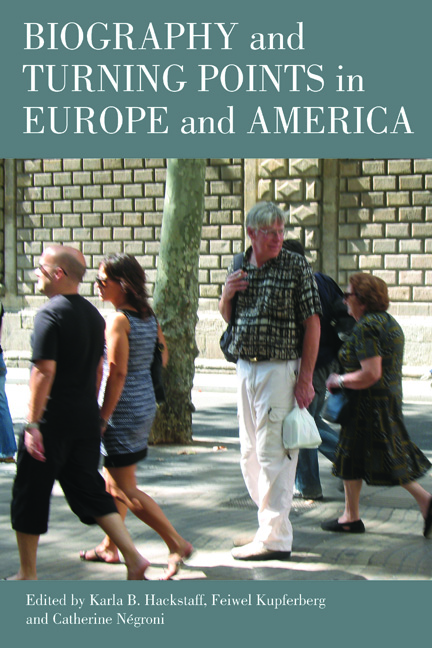Book contents
- Frontmatter
- Contents
- Notes on contributors
- Introduction: Advancing the dialogue on turning points
- one Unpacking biographical narratives: investigating stories of artistic careers in Northern Jutland, Denmark
- two Turning points in the life course: a narrative concept in professional bifurcations
- three Conjugal separation and immigration in the life course of immigrant single mothers in Québec
- four Migration biography and ethnic identity: on the discontinuity of biographical experience and how turning points affect the ethnicisation of biography
- five Biographical structuring through a critical life event: parental loss during childhood
- six Decisive turning points in life trajectories of violence among young men in the barrios of Caracas: the initiation and biographical reconversion to non-violent lifestyles
- seven The turning points of the single life course in Budapest, Hungary
- eight Complicating actions and complicated lives: raising questions about narrative theory through an exploration of lesbian lives
- nine Religious conversion as a biographical turn/ing: the case of Orthodox believers in contemporary Russia
- ten Conclusion: theorising turning points and decoding narratives
- Index
four - Migration biography and ethnic identity: on the discontinuity of biographical experience and how turning points affect the ethnicisation of biography
Published online by Cambridge University Press: 01 September 2022
- Frontmatter
- Contents
- Notes on contributors
- Introduction: Advancing the dialogue on turning points
- one Unpacking biographical narratives: investigating stories of artistic careers in Northern Jutland, Denmark
- two Turning points in the life course: a narrative concept in professional bifurcations
- three Conjugal separation and immigration in the life course of immigrant single mothers in Québec
- four Migration biography and ethnic identity: on the discontinuity of biographical experience and how turning points affect the ethnicisation of biography
- five Biographical structuring through a critical life event: parental loss during childhood
- six Decisive turning points in life trajectories of violence among young men in the barrios of Caracas: the initiation and biographical reconversion to non-violent lifestyles
- seven The turning points of the single life course in Budapest, Hungary
- eight Complicating actions and complicated lives: raising questions about narrative theory through an exploration of lesbian lives
- nine Religious conversion as a biographical turn/ing: the case of Orthodox believers in contemporary Russia
- ten Conclusion: theorising turning points and decoding narratives
- Index
Summary
Introduction
Allons! whoever you are come travel with me!
Traveling with me you find what never tires.
I swear to you there are divine things more beautiful than words can tell … (Whitman, 1965, p 154)
There is no single way of understanding migration, but the one I know of is to think of it as a journey with a certain goal. In times of global migration, there are countless people on the move every day. They intentionally set forth to make new achievements and take new chances in life. Thus, it often surprises me that there is hardly any empirical research that emphasises the empowering aspects of migration experience, and only a few researchers who conceptualise migration as an exciting, hopeful, future-oriented biographical project (see Morokvasic, 1991, 1993; Apitzsch, 2000, 2003; Lutz, 2000). Instead, migration is understood mostly as a biographical crisis defined through a trajectory of suffering: concepts that stress the disturbing and uncomfortable nature of the migration experience. In this context the emphasis is on the hardship of change, displacement and disappearance of well-known everyday life's patterns. Hence, the concept of turning point comes to the fore.
Interestingly enough, Anselm Strauss, who first came up with the concept of the turning point, was interested mainly in research on chronic illness and the suffering of patients affected by it. Similarly, the way in which some scholars in migration studies refer to this concept seems to be biased on a notion of suffering caused by sudden life changes, of which migration leaves the greatest imprint. According to this conceptualisation, migrants are viewed as individuals who have lost control of their Schicksal (destiny) and who are hardly able to exert an influence on their own lives. This seems problematic insofar as migration is only very rarely an unintentional act, and can therefore hardly be compared with a deadly illness or any other sudden, unexpected life change that we experience and over which we have no control. Since migration is usually a meaningful and future-oriented activity, migrants are entrepreneurs willing to take a risk to change their current biographical situation in the first place.
- Type
- Chapter
- Information
- Biography and Turning Points in Europe and America , pp. 93 - 124Publisher: Bristol University PressPrint publication year: 2012

